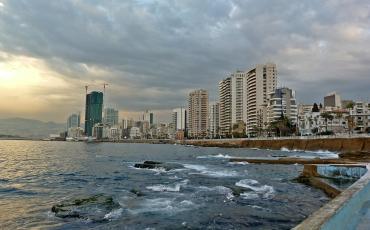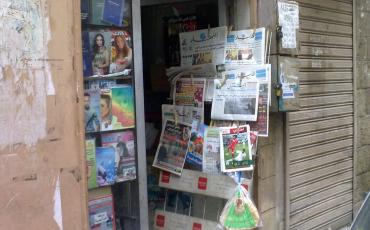#YouStink! – it all began with posts, videos and articles on social media, angrily criticizing the Lebanese government for a complete deadlock with regard to the waste management crisis. But then the movement quickly grew into Lebanon’s biggest wave of protests in recent history. Sahar Ghoussoub and Patrick Manolli, who have been involved from the beginning, share their impressions.
As trash bags have been piling up in the streets across the entire country, threatening Lebanon’s ecosystem and underground water, the #YouStink movement was the first to start mobilizing support, calling for sustainable solutions for the waste-crisis. It was initiated by a group of young liberal intellectuals. At the beginning, only small groups of people took to the street. But the movement quickly resonated with the wider public. Then, August 23 was a turning point in Lebanon’s modern history: Scores of people of all walks of life, sects and religions, swarmed in Riyadh El Soleh and the Martyr Square, putting their political affiliations aside and joining voices to call for one pressing issue: the management of waste.
However, in what seemed a reproduction of the “Arab Spring”, things took a different turn. First, people started shouting slogans demanding the ousting of the current regime and the resignation of corrupt politicians. Then, the situation escalated when brave young people marched against the Parliament headquarters in the Star Square in downtown Beirut. They came up against a wall of security officers blocking their way. Clashes broke out as security officers and policemen pounced on protesters, who stood their ground trying to talk sense into their “fellow military” countrymen – but to no avail. The riot police did not stop pushing and hitting unarmed civil protesters, as teargas grenades were thrown at the crowd to disperse them.
In a few moments, what started as a peaceful protest, calling for the basic rights of the Lebanese people that have been living under the “mercy” of a rotten regime for far too long, ended in clashes and arrest of many unarmed young men and women, who have been also beaten up.
Against all odds
Many believed that the “civil movement” could not stand a chance in Lebanon, a country where political and blind partisan affiliations and subordination are rife. In the run-up to August 23, fear-mongering was widespread. Politicians, namely Michel Aoun of the Free Patriotic Movement (FPM), appeared on television warning that the demonstrations were akin to the “Arab Spring”, which spelled doom for the Arab nations, Syria in particular. He called for ending it all before it would lead to what he called “creative chaos.” Some of the protesters believe Aoun tried to hijack the protest-movement. One of the ministers affiliated with his parliamentary bloc, Minister of Education Elias Bou Saab, wanted to join the demonstration, but was kicked out of the protests squares. People demanded him to resign first then join their ranks, which he refused.
For his part, Interior Minister Nouhad al-Mashnouq, said the demonstrations were “chaotic”, therefore the riot police had to intervene. In such statements, it became clear that politicians did not fathom the message of the people who are fed up with their dire everyday living conditions. In response to such parochialism, two further movements under the banner of #YouStink were launched.
The first was dubbed badna nhasseb (“we want accountability”), calling for justice for the protesters who were beaten up by policemen and demanding that they must be held accountable for their acts. The second called for the resignation of all the current ministers and party leaders, without any exception. A hashtag was created #كن_يعني_كلن (“everyone without any exception”), which has since gone viral on social media. In this way, activists started sharing photos of politicians and sectarian leaders on trash bags demanding their departure, including Hezbollah’s Hassan Nasrallah. Then, the Shiite party itself intervened to remove any picture of their leader. Thus, the civil movement was sadly boycotted by a vast majority of pro-Hezbollah youth, who constitute a large proportion of the Lebanese social fabric.
“Go away”
Another “secular” demonstration took place once again in downtown Beirut on Aug. 29, as thousands of people flocked in, holding up the same demands and waving the Lebanese flag. This time no clashes broke out as the march was more organized and the riot police were given orders not to attack. The people took one stance: “We don’t want any of you,” “Go away,” “Down with corrupt politicians.” They called for a new election law and want the post of the president to be filled, which has been vacant because of disagreements among key party-heads. This tellingly indicates that the waste crisis is merged with a crisis of governance.
Once again, secular people in Lebanon made their voice heard, showing to themselves as much as the world that they are no longer a minority, but that the majority of the people have become fed up with political quotas, corruption and blind affiliations. On August 29th, the Lebanese diaspora joined their fellow protesters and organized sit-ins in many cities around the world such as Paris, Berlin, London, Montreal and Boston.
A few days later, the organizers of the #YouStink movement called for a peaceful sit-in in front of the Ministry of the Environment after they had entered the Ministry demanding the immediate resignation of Minister of the Environment Mohammad el-Machnouq. As a result, activists and protesters as well as media correspondents were violently thrown out of Ministry building. Some were in need of immediate medical aid.
Outraged by the “deaf ears” of the political class, 14 protesters set up tents in front of the Ministry of the Environment and declared a hunger strike until Machnouq’s resignation. From there, protestors reported: “Sadly, it is very difficult for the Lebanese to truly join hands and scream with a united voice in the face of the corrupt politicians who have been accused of doing nothing for the past 25 years (since the Taef Accords in 1990) but to exploit power for personal interest, further drowning the country in public debt,” says one hunger striker. His fellow protester states that he has been “abducted” by the security forces as he was being hospitalized due to health complications resulting from the hunger strike. “I was savagely dragged to the police station and kept there several hours before they released me,” he said.
At a crossroads
In the meantime, Michel Aoun is eager to take up the presidential seat. To bolster his claim, Aoun, the “hijacker of the people’s revolution”, called for a large march and demonstration last Friday, September 4. Not surprisingly, he expressed the same demands as the secular and liberal civil movement. But he instigated against us: “The people should know the difference between the bad demonstrations, supported by foreign parties, and the true national demonstration stemming from the people’s will.” Against the backdrop of such propaganda, people swarmed in downtown Beirut, demanding reforms, political change and the election of a president. This time however, there was only one difference: The demonstration was held under the orange banner of the FPM, while the Lebanese flag was absent and calls were made for Aoun, another warlord, to become president.
In response, the #YouStink movement and the rest of its “branches” have scheduled another peaceful demonstration today, on Wednesday September 9. It is our hope that the Lebanese people will take a national stance and stand up against corruption, regardless of their sects or religions. At this day, Lebanon is standing at a crossroads: We can either seize this golden opportunity and break free from a sectarian regime and political affiliations, or remain at the mercy of warlords and corrupt political bosses.






















